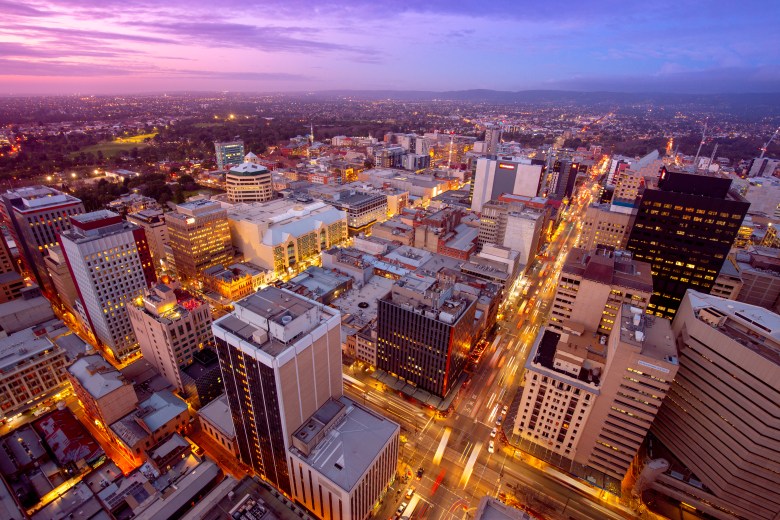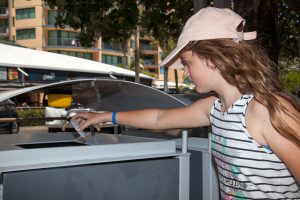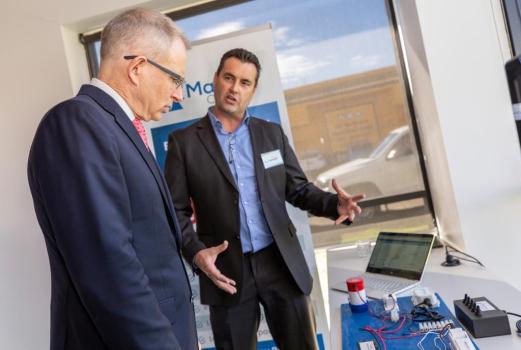
Local governments on the forefront of smart city approaches are realising the power of data to inform service delivery and long-term planning.
Most offices joke about the 3pm slump but businesses in Adelaide were reporting a noticeable loss of productivity every afternoon when an after-school surge in internet use was dramatically slowing their access to cloud servers.
“This issue of congestion on the internet was affecting their productivity,” says Peter Auhl, associate director of information management at the City of Adelaide.

This loss of connectivity provided the inspiration for Ten Gigabit Adelaide, the council’s fibre optic data network being rolled out across the city and north Adelaide. The City of Adelaide has partnered with TPG Telecom on the project.
“What we needed to do was look at a product that got as much business transactions off the internet and onto private networks, and that’s the nucleus of the project,” Mr Auhl tells Government News.
It took the city just nine weeks to sign up 1,000 buildings to the network, far quicker than the scheduled six months. The project timeline is for all 1,000 buildings to be connected within two years. In total, the council predicts the network will benefit 3,500 businesses and organisations.
Currently 85 buildings are connected and some are reporting as much as a 90 per cent reduction in costs as well as increased speed and reliability of connection, Mr Auhl says.
The interest is coming from businesses and organisations across a wide range of sectors, from healthcare and education to legal and creative firms.
“Imagine having a radiographer in one part of the city providing real-time services to our hospital precinct without touching the internet, or three different creative firms across the city collaborating on a film, or different legal firms joining to the courts’ administration authority and having a private network to transmit data through. The use cases are endless,” he says.
The city has also secured fibre for its own use to help progress its smart city program, which include a traffic signalling project and smart lighting trials.
“We have a large smart parking project with about 3,000 sensors being put across the city where the aim is for customers to more easily find their way to a car space, while being able to later top up through a mobile application,” he says.
Significantly, the “engine room” behind these various projects is the council’s data management platform, which pulls together the various data and curates it, says Mr Auhl.
“We’re looking at ways we can monitor where people are moving through the city so we can create a better amenity. Imagine being able to forecast what streets crowds of people will walk down after a football match, so we can determine what lighting we need in that environment, whether to let cars in at that time.”
He also points to the council’s open insights platform which earlier this year provided a range of economic data for public use.
“Using the data management platform we brought together myriad different data from sources like the Australian Bureau of Statistics and our own survey data and then gave it back to customers as a toolkit of information,” Mr Auhl says.
Management platform
Similarly, Sunshine Coast Council says that its smart region management platform is proving essential to its smart city approach and the use of data to inform decision-making.

“A core component of an integrated smart city is where you have smart meters and sensors talking to each other, and on a visualisation platform,” says Jacqui Gray, smart city officer with the council.
“This is live data from environmental sensors, on electricity consumption, public Wi-Fi, parking, waste, our solar farm; it’s also a management tool for council to look at our service delivery.
“But we can also go back in time and look at the Caloundra Music Festival last year, for example, and see where bins overflowed, where there were parking or traffic issues, and then forecast to this year’s festival and adjust our services accordingly,” she says.
The data is also being used for long-term planning, Ms Gray says, pointing to a major foreshore redevelopment project underway.
“Previously architects would draw up a toilet block and add in eight toilets, let’s say, largely based on a guess. Whereas we now have data that shows how many people use the existing toilet block, how many use the pathways in and out, which can inform the design and planning,” she says.
Guided by a smart city framework and an implementation plan, the council is rolling out an ambitious program that has included an Australian-first automated waste collection system in the new Maroochydore City Centre, autonomous mowers, digital water meters and smart sprinklers that link to weather data.

While the new city centre in Maroochydore was the initial catalyst for the council’s smart city agenda, Ms Grey stresses that the program is being rolled out across the local government area.
“Whether it’s free Wi-Fi in the showgrounds, our solar farm, smart poles on the main street in Caloundra, using drones to inspect infrastructure like bridges or coastal erosion – there’s so much going on and its right across the area.”
To ensure residents and community stakeholders can engage with the smart city agenda, the council also established a smart centre on the main street of Caloundra, which showcases many of the technologies being used.
The centre has had visits from other local governments, school groups, university students, seniors, engineers and architects, Ms Gray says.
“We’re very open with other councils, our framework and reports are all published. When other councils come here we tell them what’s worked and what hasn’t, what we’ve learned. That transparency is really important,” she says.
The City of Adelaide and Sunshine Coast Council are both finalists in the leadership city category of the upcoming Smart Cities Awards, to be announced on 30 October.
Follow Government News for further updates on councils’ smart city initiatives.
Comment below to have your say on this story.
If you have a news story or tip-off, get in touch at editorial@governmentnews.com.au.
Comment below to have your say on this story.
If you have a news story or tip-off, get in touch at editorial@governmentnews.com.au.
Sign up to the Government News newsletter

